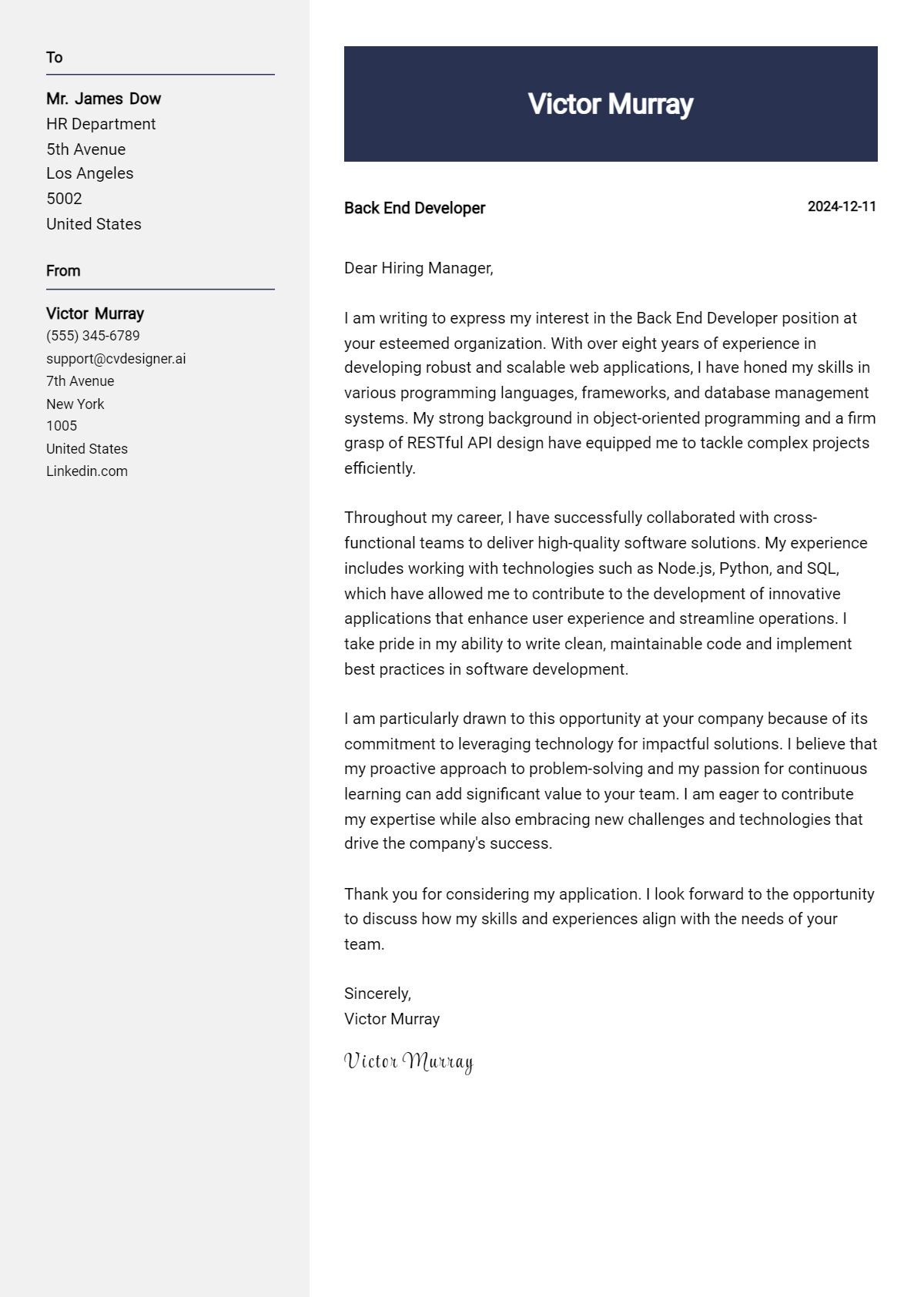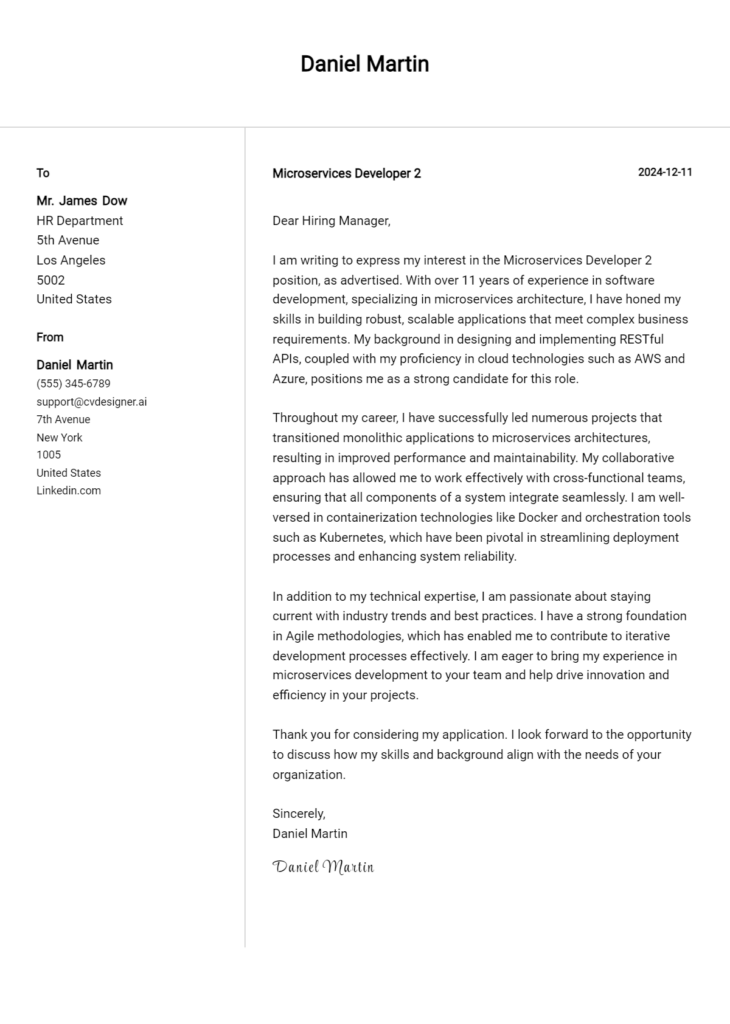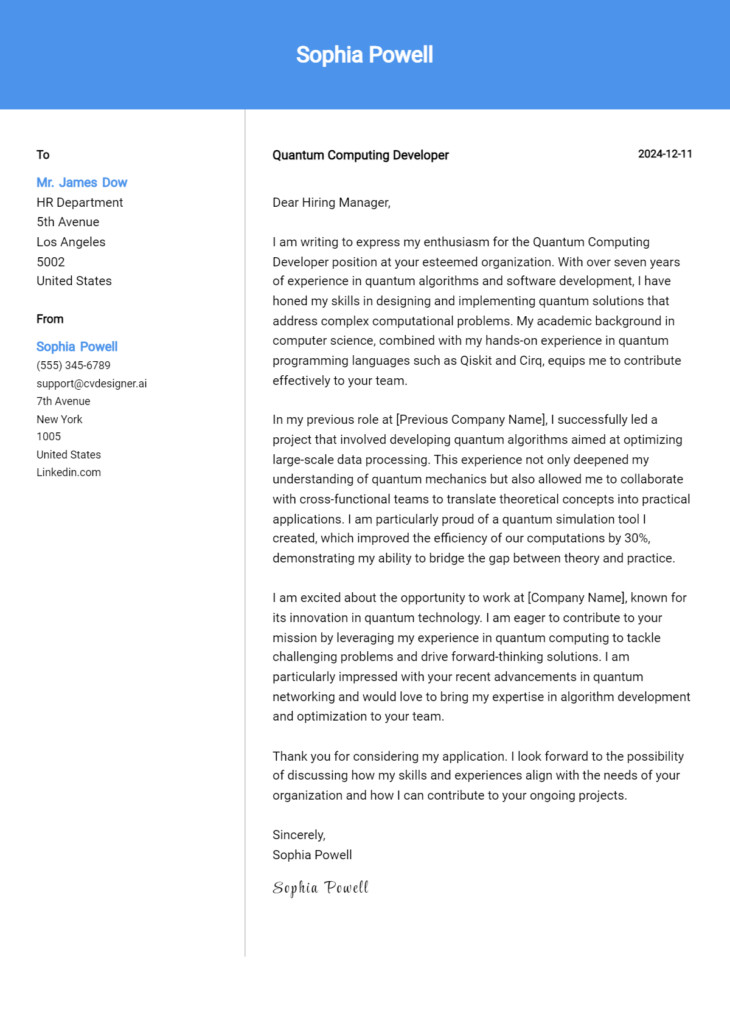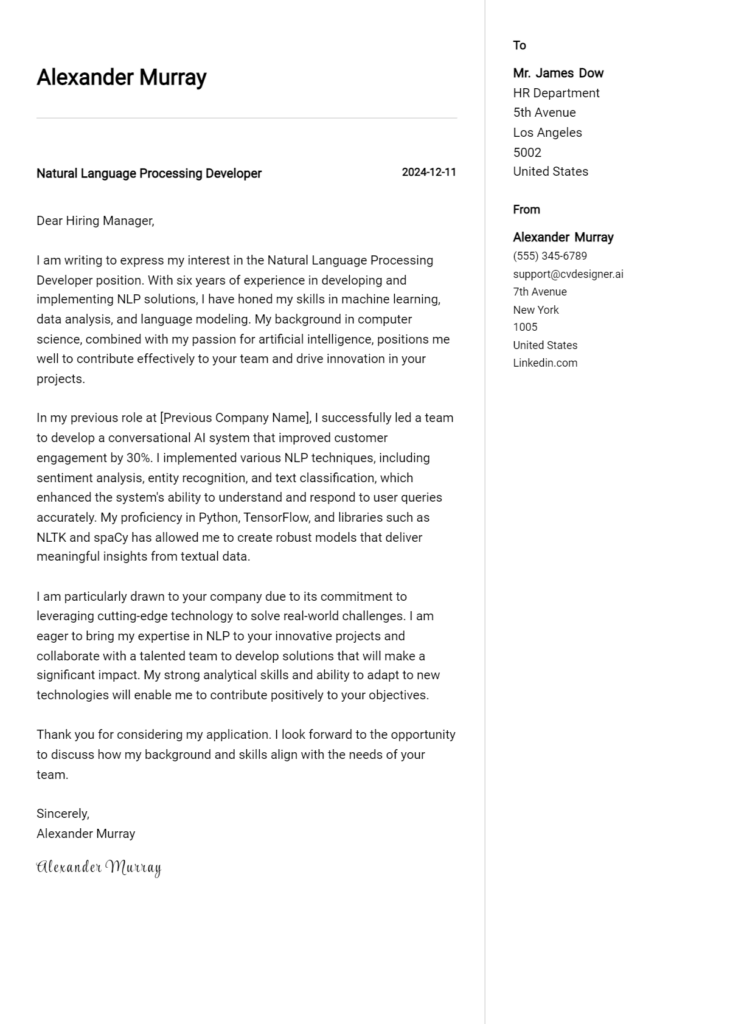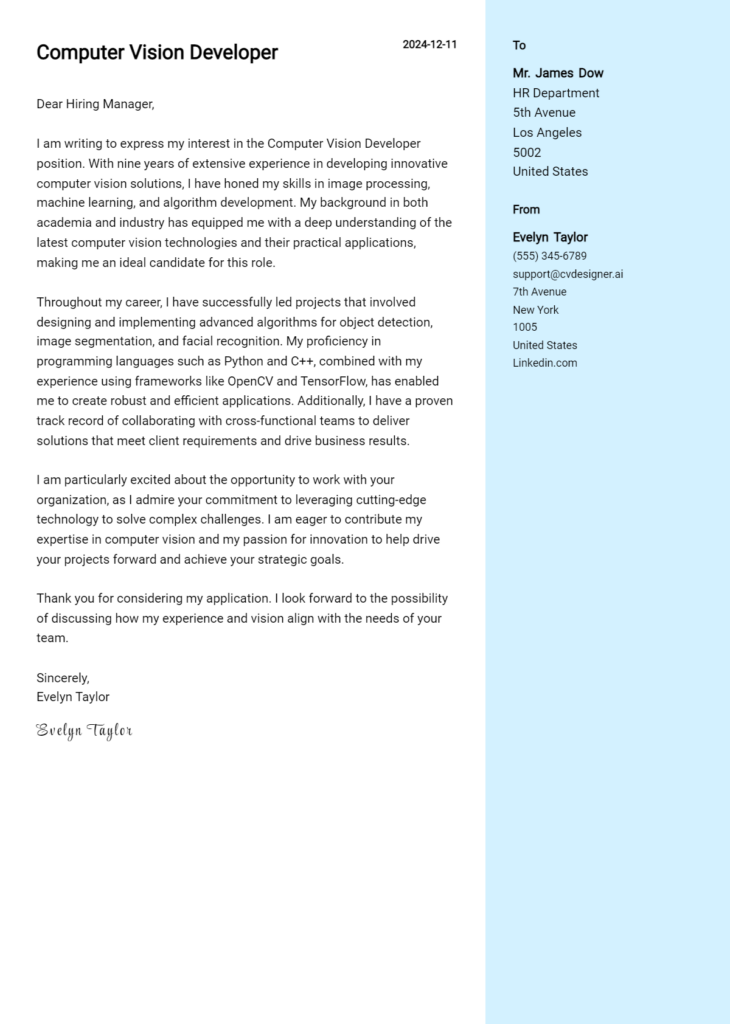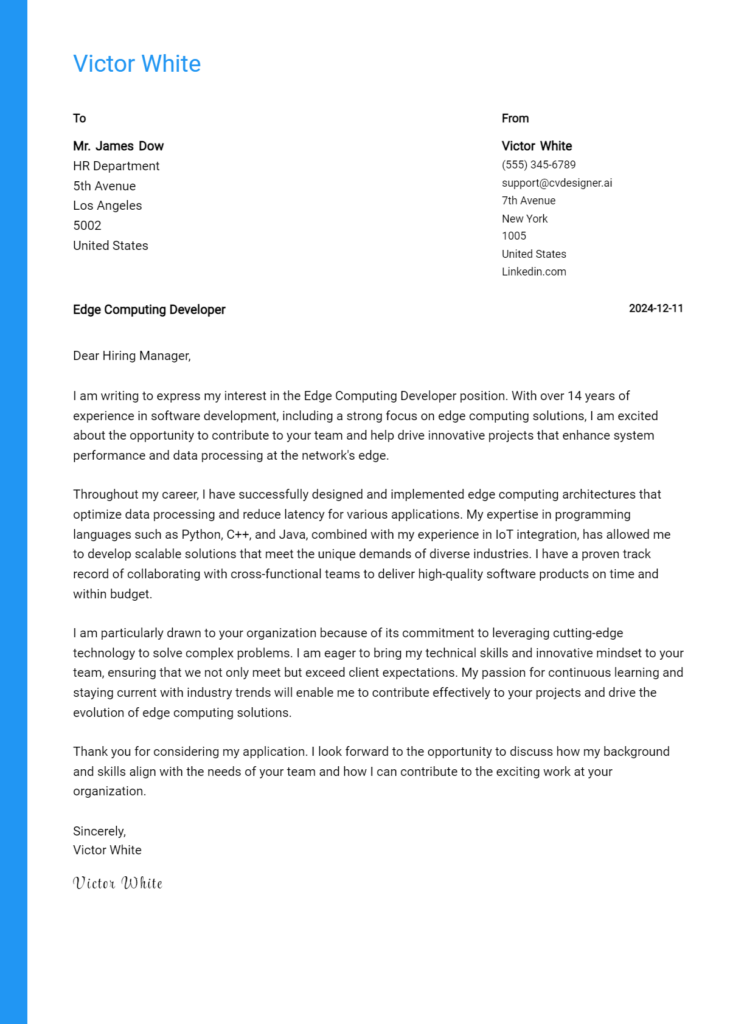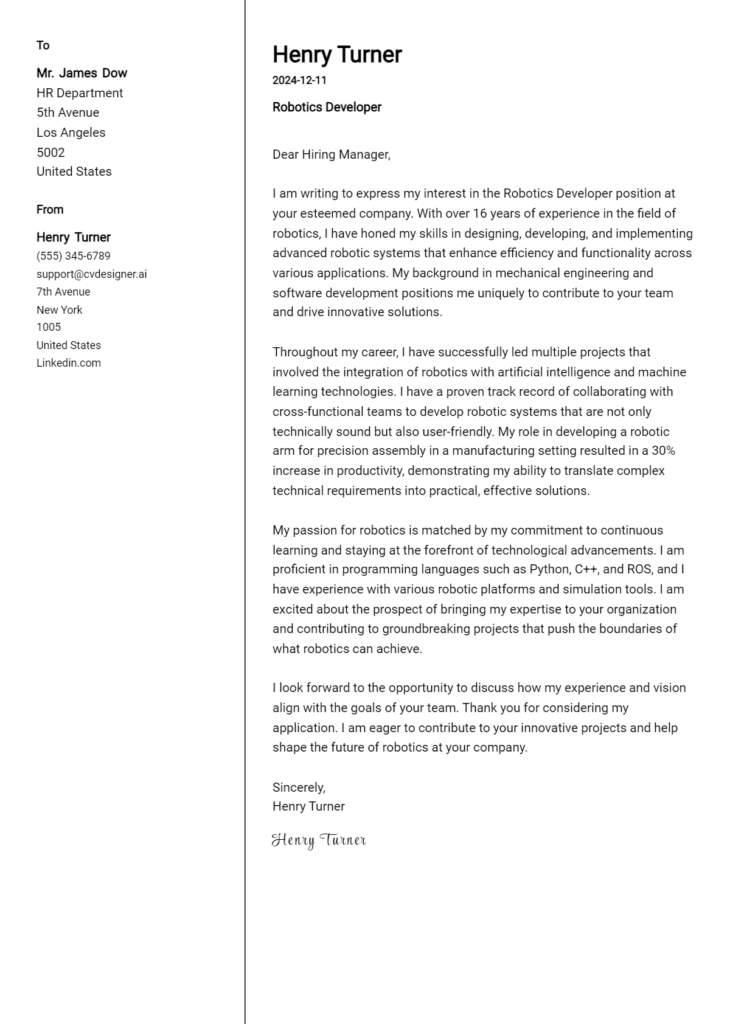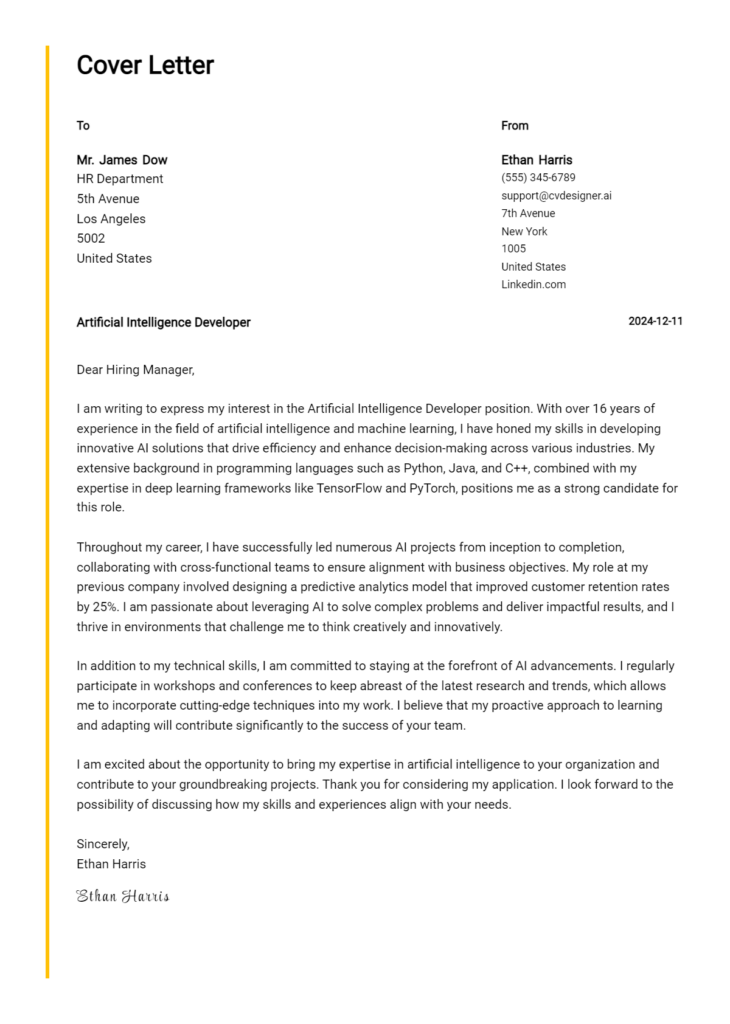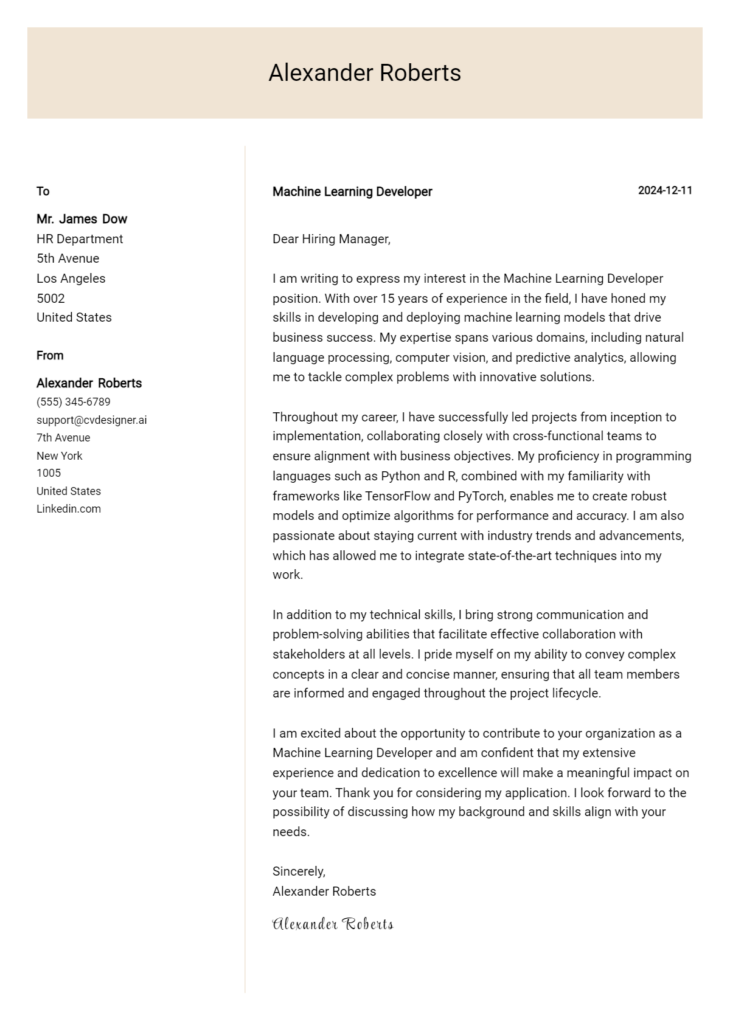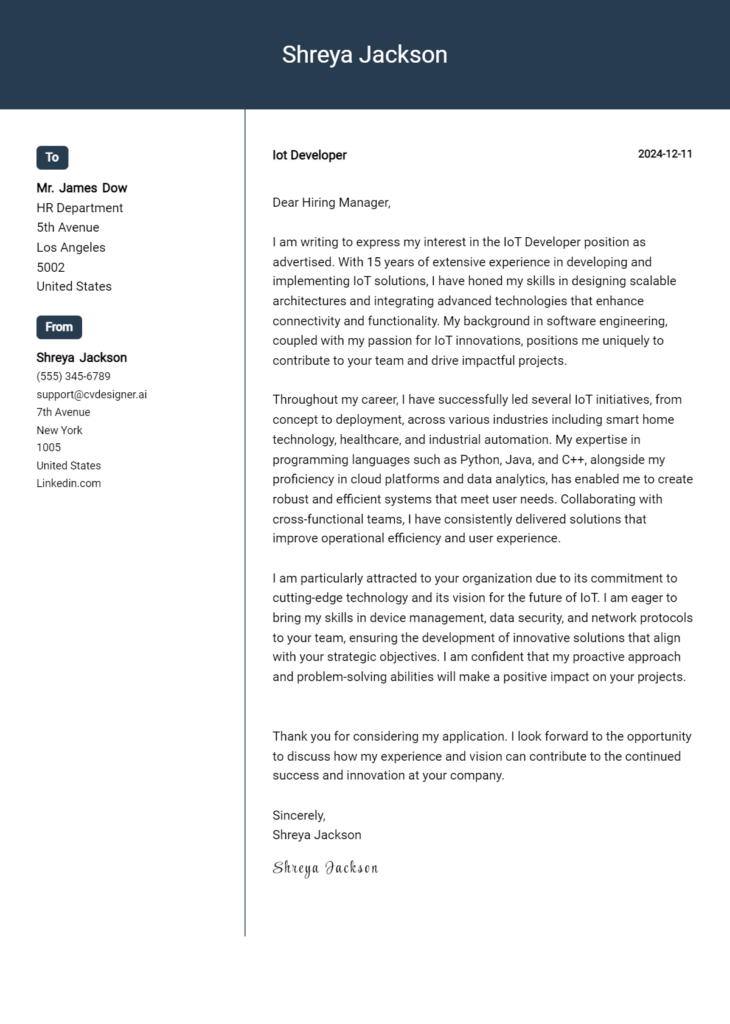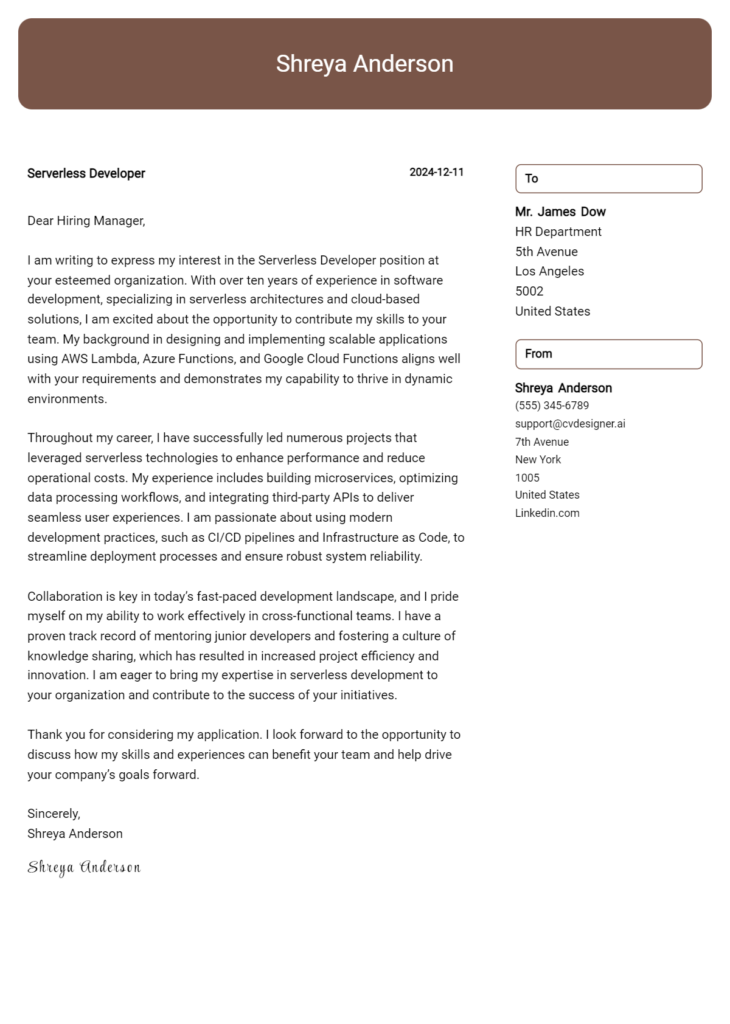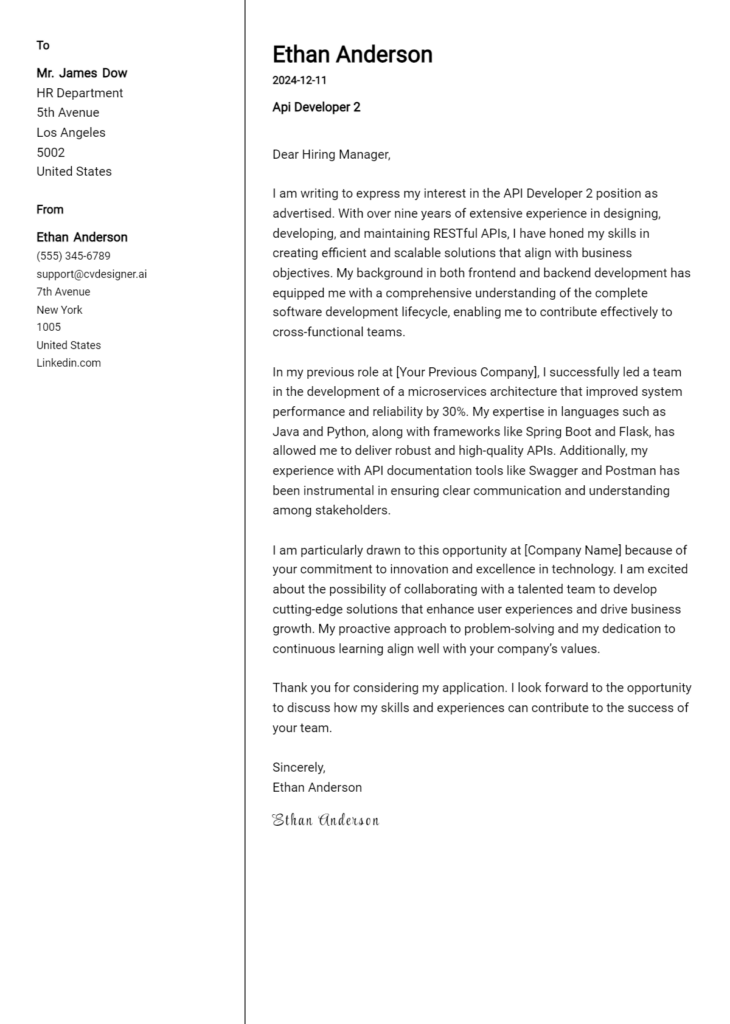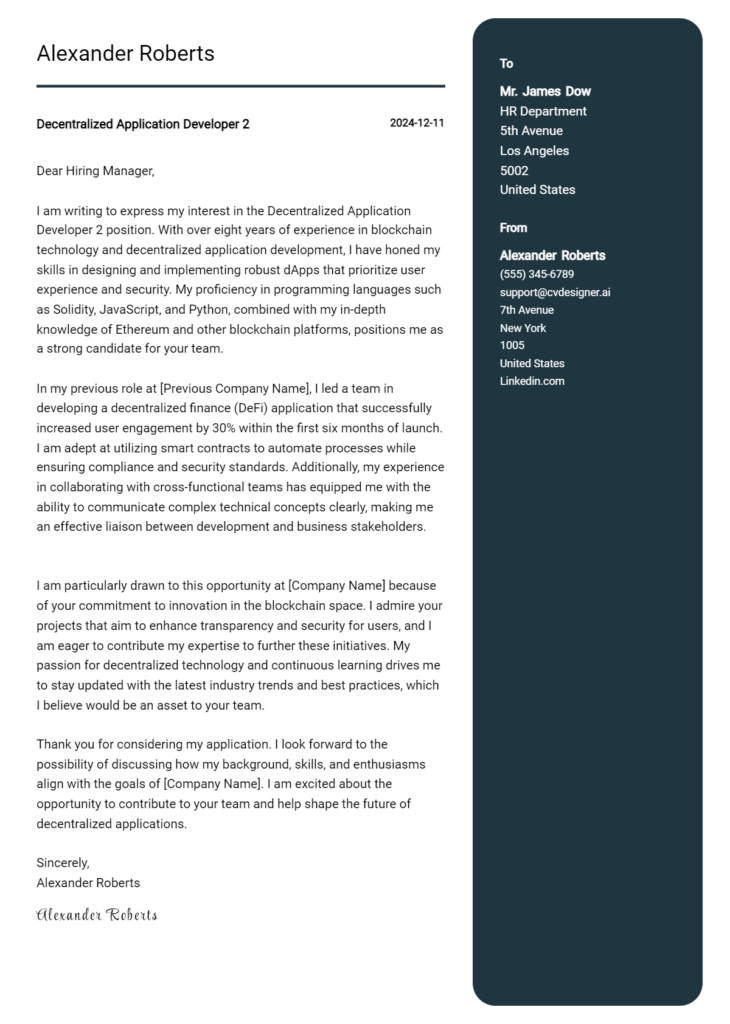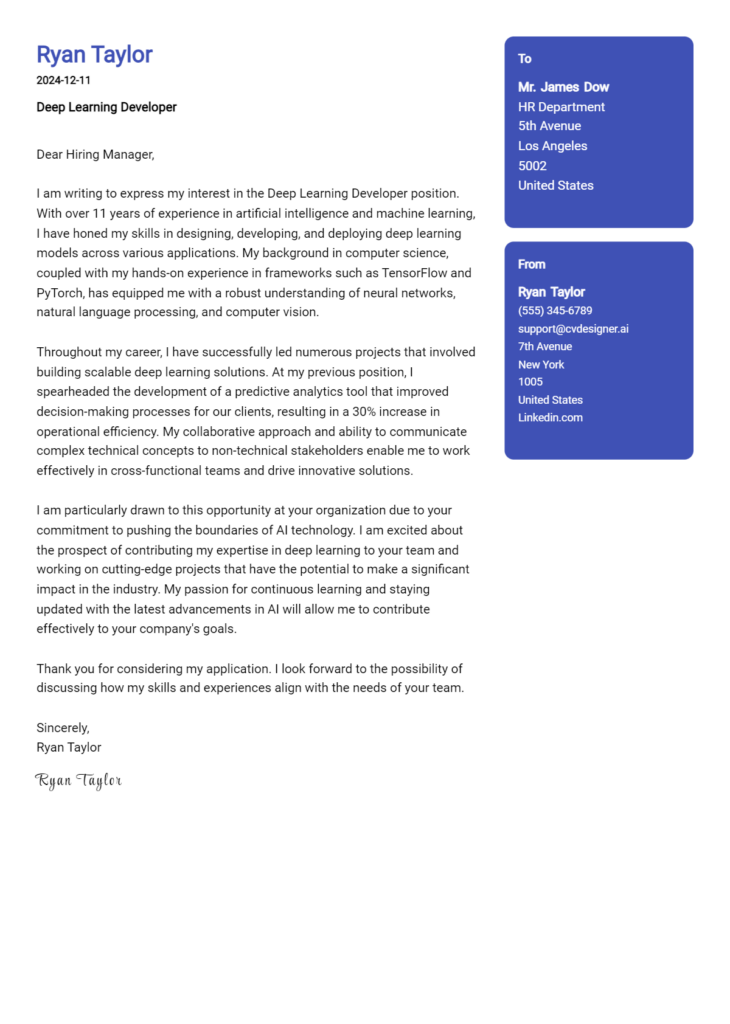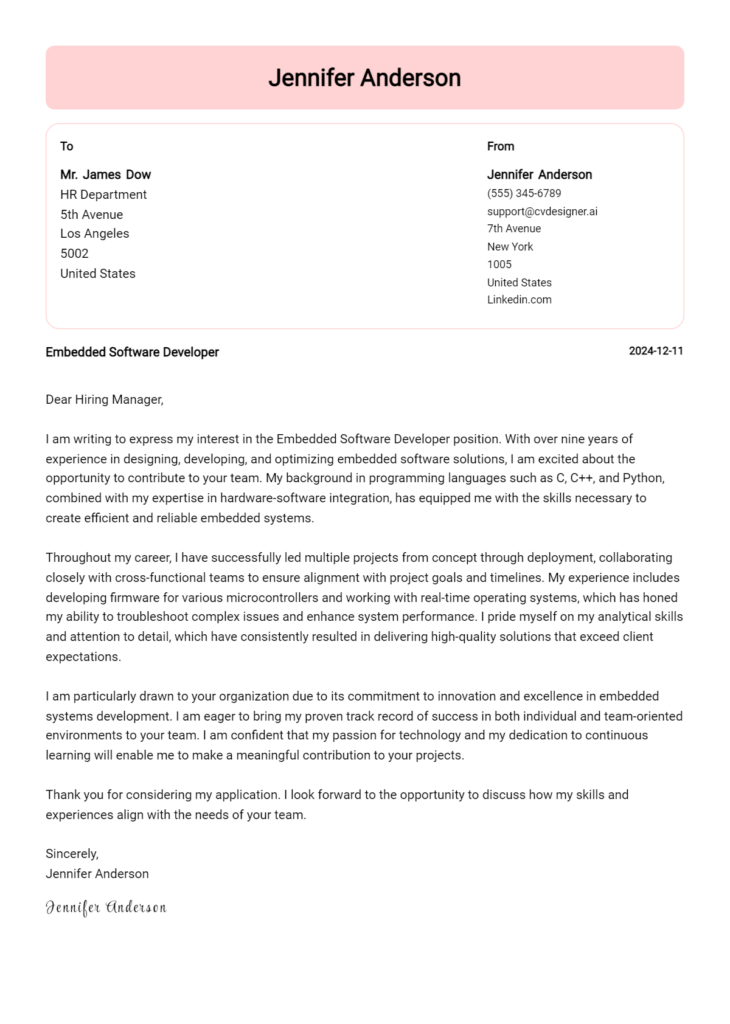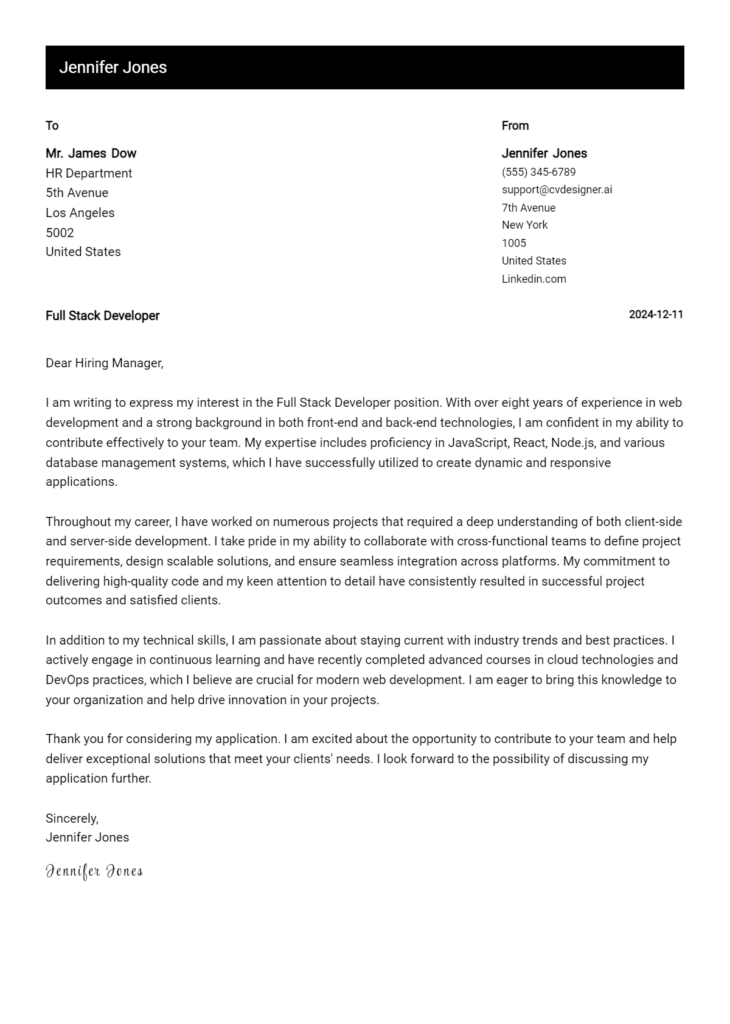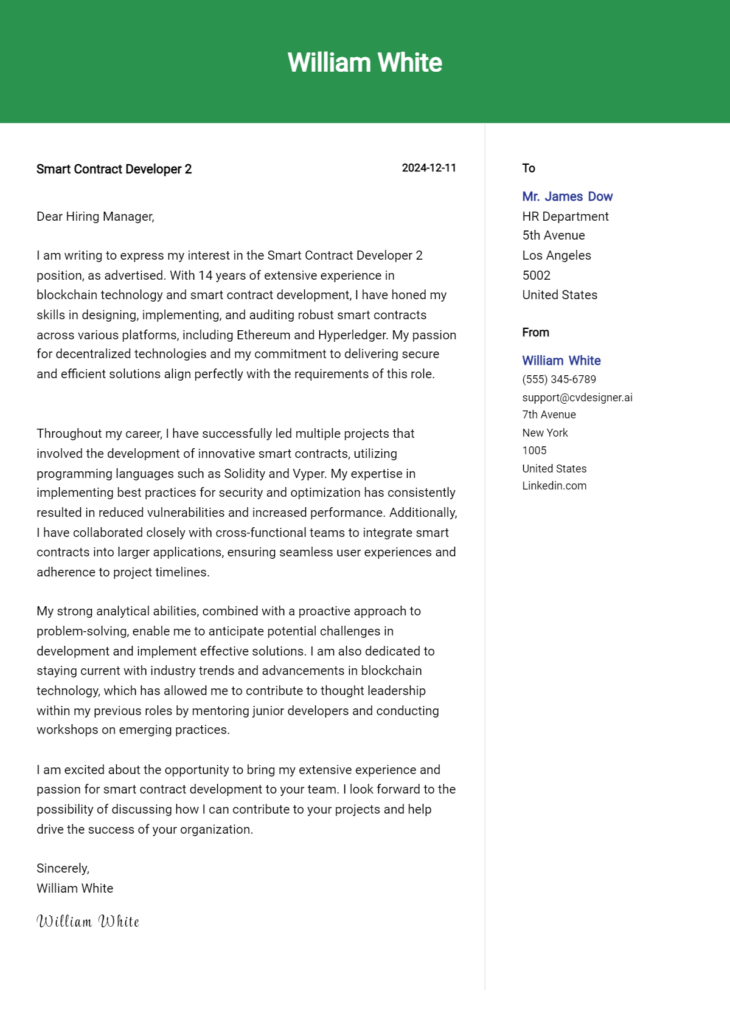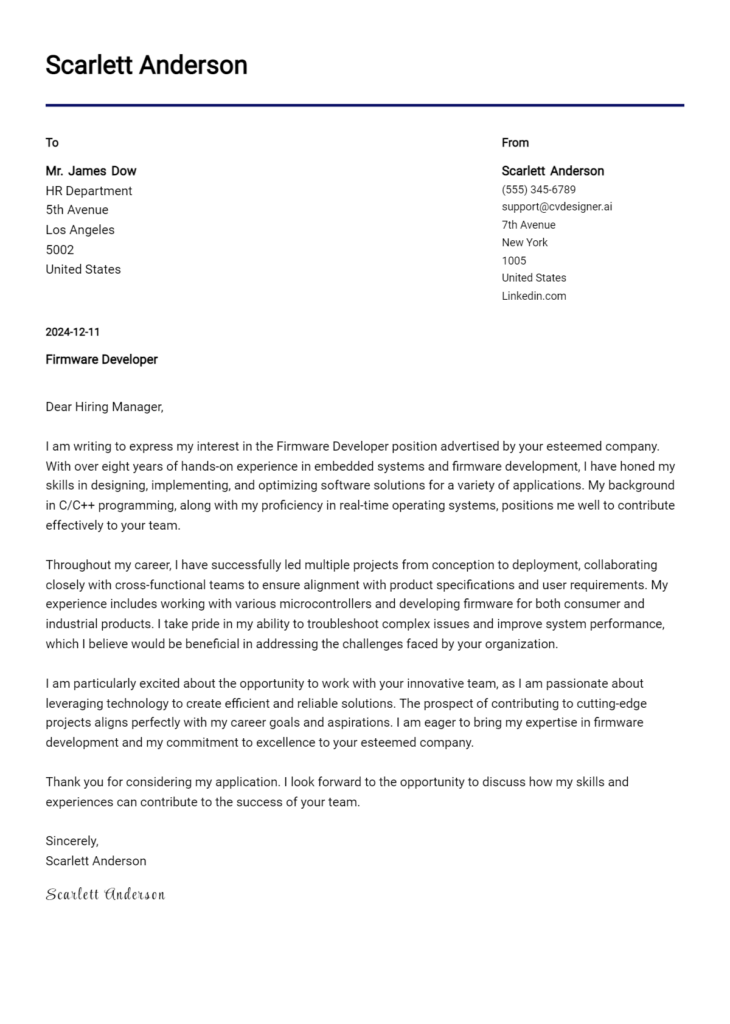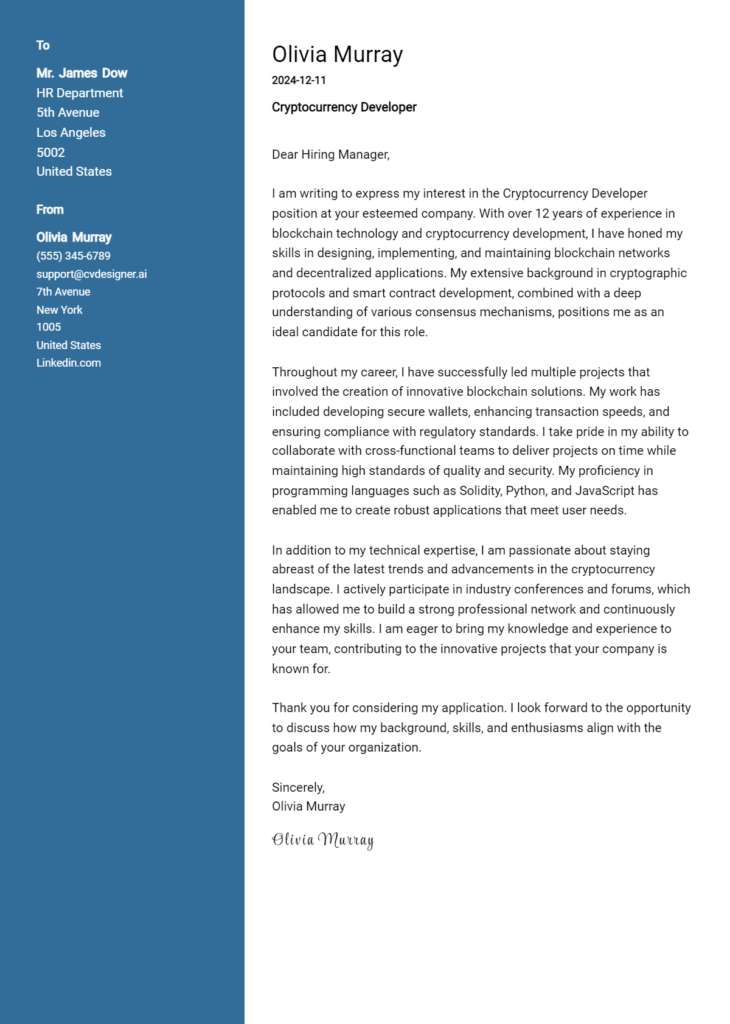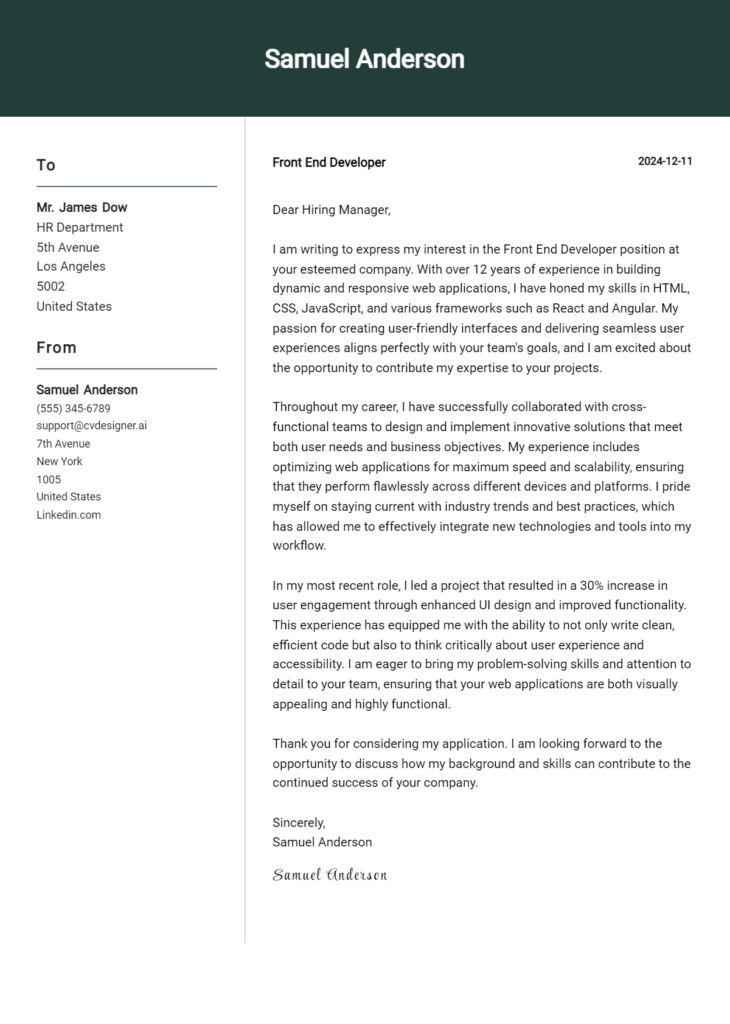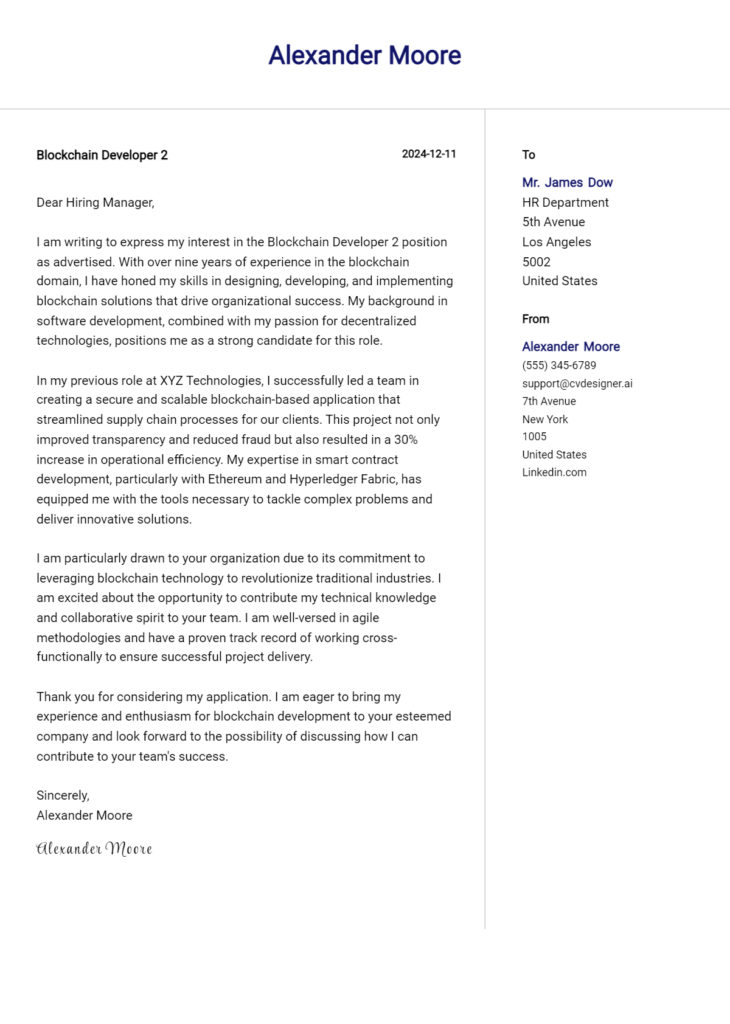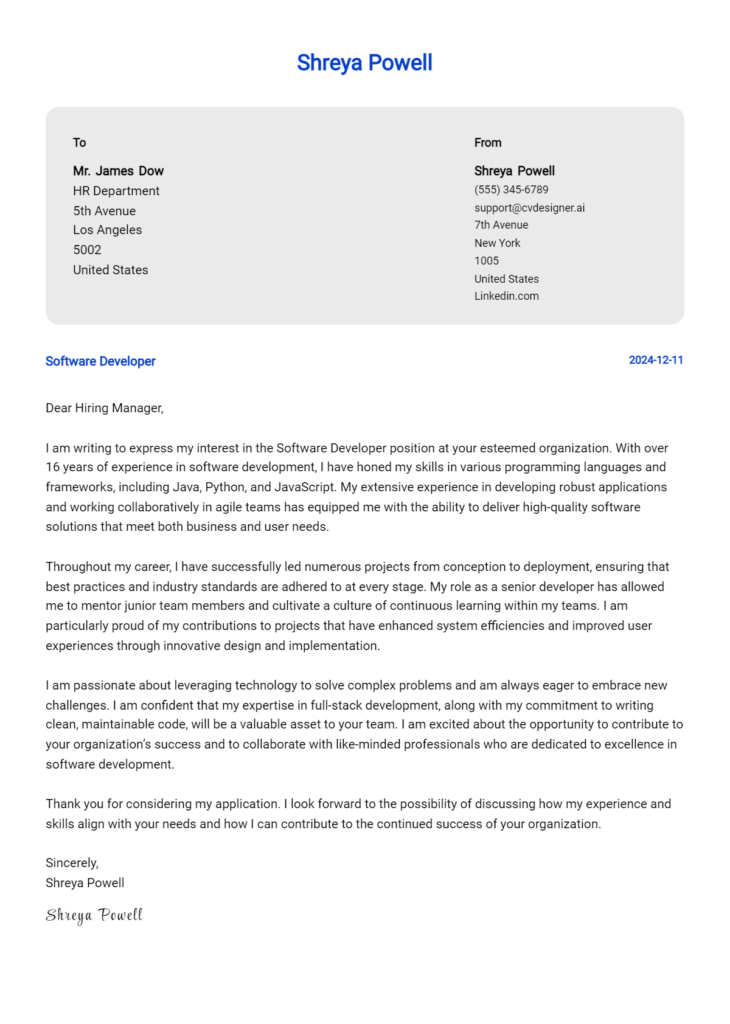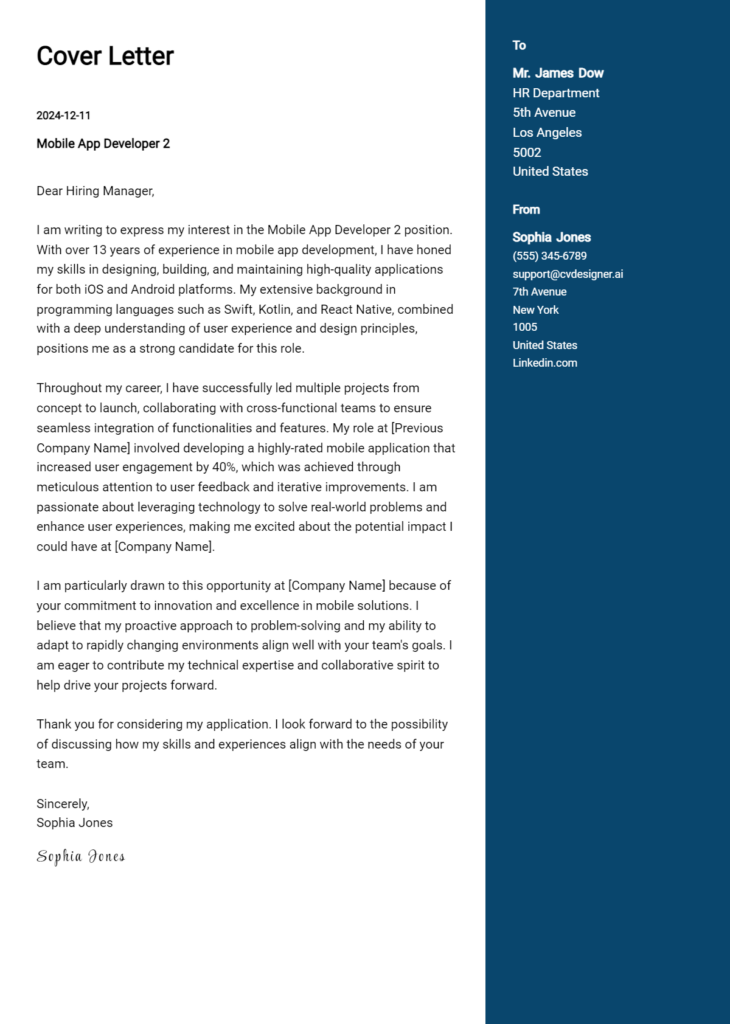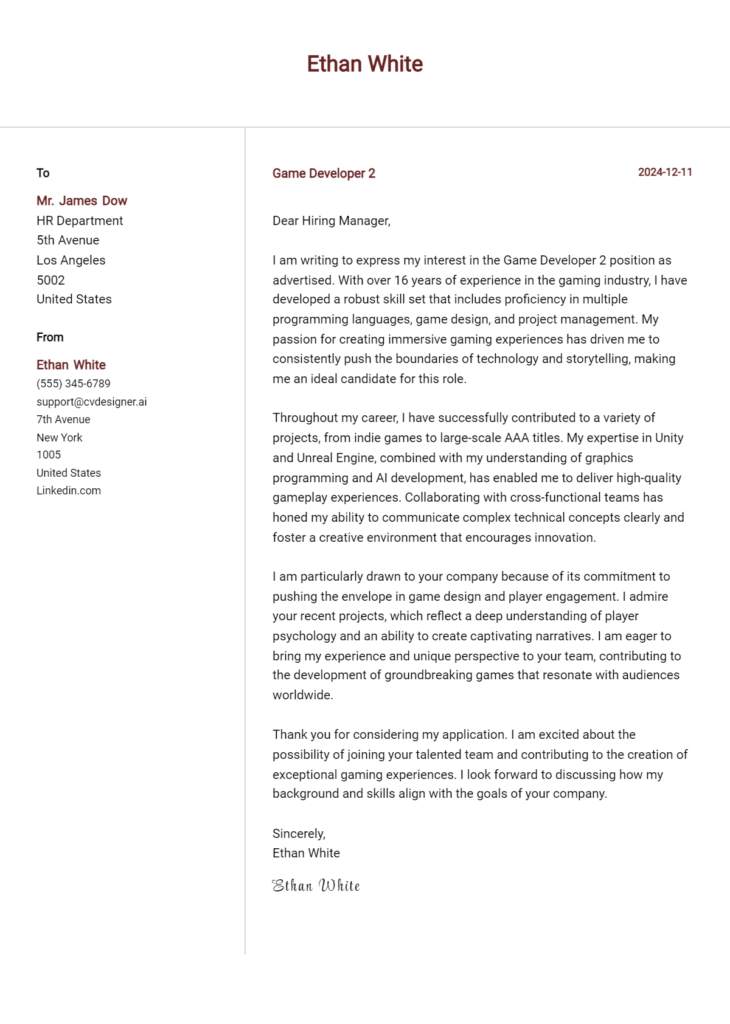Back End Developer Cover Letter Examples
Explore additional Back End Developer cover letter samples and guides and see what works for your level of experience or role.
How to Format a Back-End Developer Cover Letter?
Crafting a compelling cover letter is essential for a Back-End Developer, as it serves as your first opportunity to demonstrate your technical expertise and problem-solving abilities. The way you format your cover letter can significantly impact how hiring managers perceive your skills and professionalism. A well-structured letter not only showcases your qualifications but also reflects your understanding of coding best practices, organization, and attention to detail—attributes that are invaluable in back-end development.
In this guide, we'll outline how to format your cover letter effectively, providing insights and examples tailored specifically for back-end developers.
We'll focus on the essential components of a professional cover letter, including:
- Cover Letter Header
- Cover Letter Greeting
- Cover Letter Introduction
- Cover Letter Body
- Cover Letter Closing
Each section is crucial for conveying your technical skills and enthusiasm for the role. Let’s break down each part and explain how to create a standout cover letter that aligns with your back-end development career.
The Importance of a Cover Letter Header for a Back-End Developer
The cover letter header is a critical component of your application as a Back-End Developer. It serves as the first impression for potential employers and establishes your professionalism and attention to detail. A well-structured header should include your contact information, the date, and the recipient's details. Clarity is paramount; the header should be easy to read and formatted neatly to convey your organizational skills. A strong header not only demonstrates your ability to present information clearly but also sets a positive tone for the rest of your cover letter.
Strong Example:
John Doe 123 Developer Lane San Francisco, CA 94105 (123) 456-7890 johndoe@email.com October 10, 2023 Hiring Manager Tech Solutions Inc. 456 Industry Blvd San Francisco, CA 94107
Weak Example:
johndoe@email.com 123 Developer Lane San Francisco, CA 10/10/23 Hiring Manager at Tech Solutions Inc.
The Importance of a Thoughtful Cover Letter Greeting
A well-crafted cover letter greeting is crucial as it sets the tone for the entirety of the letter. Addressing the hiring manager directly not only demonstrates professionalism but also adds a personal touch that can make your application stand out. A personalized greeting shows that you have taken the time to research the company and the individual you are addressing, which reflects your genuine interest in the position. Avoiding generic greetings, such as "To Whom It May Concern," is essential as they can come off as impersonal and may suggest a lack of effort. If you’re unsure of the recipient's name, take the time to look it up on the company website or LinkedIn. This small step can significantly enhance the effectiveness of your cover letter.
Strong Greeting Example
Dear [Hiring Manager's Name],
Weak Greeting Example
To Whom It May Concern,
Cover Letter Introduction for Back-End Developer
A well-crafted cover letter introduction is crucial for a Back-End Developer, as it serves as the first impression to the hiring manager. This introduction should not only capture attention but also convey genuine interest in the role and briefly highlight the candidate's relevant skills or achievements. A strong introduction sets the tone for the rest of the letter, making it essential to effectively communicate your passion for development and your technical capabilities. Below are examples of both strong and weak introductions to illustrate the difference.
Strong Example
Dear [Hiring Manager's Name], As a dedicated Back-End Developer with over five years of experience in building robust web applications, I am excited to apply for the Back-End Developer position at [Company Name]. My expertise in languages such as Python and Java, coupled with my proven track record in optimizing database performance, aligns perfectly with your team’s mission to deliver high-quality and scalable solutions. I am eager to contribute my skills to [Company Name] and help elevate your back-end architecture to new heights.
Weak Example
Hello, I saw the job posting for a Back-End Developer and thought I should apply. I have some experience with programming and databases. I hope I can get an interview.
Cover Letter Body for Back-End Developer
The cover letter body serves as a critical platform for a Back-End Developer to articulate their technical proficiencies, relevant experiences, and the distinct value they bring to a prospective employer. In this section, the candidate should highlight specific projects that demonstrate their expertise in programming languages, frameworks, and database management. By detailing accomplishments—such as optimizing server performance, implementing RESTful APIs, or contributing to significant improvements in application scalability—the candidate can effectively convey their capabilities and how they align with the company's goals.
Strong Example
In my previous role at Tech Innovations, I successfully led a project to redesign the back-end architecture of our e-commerce platform, which resulted in a 30% increase in load speed and a 20% reduction in server costs. Utilizing Node.js and MongoDB, I developed a RESTful API that facilitated seamless integration with third-party services, enhancing overall user experience. My experience in implementing microservices has not only improved system reliability but also allowed for easier maintenance and scalability. I am eager to bring my expertise in back-end development and my passion for creating efficient, robust systems to your team at FutureTech Solutions.
Weak Example
I have some experience with back-end development and have worked on a few projects. I know how to use Python and some databases. I think I would be a good fit for your company because I like programming and want to learn more. I hope to contribute to your team.
Importance of the Cover Letter Closing for a Back-End Developer
The closing of a cover letter is a crucial element, especially for a Back-End Developer. It serves as a final opportunity to summarize your qualifications, reiterate your enthusiasm for the position, and encourage the hiring manager to take the next step, such as reviewing your resume or scheduling an interview. A strong closing can leave a lasting impression, making you stand out among other candidates, while a weak closing may come off as indifferent or unprofessional.
Strong Example
Thank you for considering my application for the Back-End Developer position at [Company Name]. With my experience in developing scalable web applications and my passion for innovative backend solutions, I am excited about the opportunity to contribute to your team. I look forward to the possibility of discussing how my skills align with your needs. Please feel free to review my resume attached and let me know a suitable time for an interview.
Weak Example
I hope you look at my resume and think about giving me a call. I guess that would be nice. Thanks for your time.
When applying for a Back-End Developer position, a well-crafted cover letter can significantly enhance your chances of standing out to potential employers. This document serves as a platform to highlight your technical skills, problem-solving abilities, and knowledge of the Software Development Life Cycle (SDLC), as well as your capacity for teamwork and passion for continuous learning. Below are some essential tips to help you create an effective cover letter that showcases your qualifications and aligns with the expectations of hiring managers in the tech industry.
Cover Letter Writing Tips for Back-End Developer
Highlight Your Technical Skills
Clearly outline your proficiency in programming languages and frameworks relevant to back-end development, such as Python, Java, Ruby, or Node.js. Be specific about your experience with databases like MySQL or MongoDB and any familiarity with cloud services. Use concrete examples to demonstrate how you've applied these skills in previous projects.Showcase Problem-Solving Abilities
Employers value developers who can tackle challenges effectively. Share a brief story illustrating a complex problem you encountered in a project and the steps you took to resolve it. This not only shows your technical prowess but also your analytical thinking and resourcefulness.Demonstrate Knowledge of the SDLC
Employers look for candidates who understand the Software Development Life Cycle. Mention your experience with various stages of the SDLC, from requirements gathering to deployment and maintenance. Discuss any methodologies you're familiar with, such as Agile or Scrum, to show your adaptability to different project environments.Emphasize Teamwork and Collaboration
Back-End Developers often work alongside front-end developers, UX/UI designers, and other stakeholders. Highlight your ability to collaborate effectively within a team. Share an example of a successful project where you worked closely with others, detailing your role and contributions to the team's success.Express a Passion for Continuous Learning
The tech industry is ever-evolving, and employers appreciate candidates who are committed to staying updated with the latest technologies and trends. Mention any relevant certifications, courses, or personal projects that reflect your dedication to continuous learning. This commitment can set you apart as a forward-thinking developer.
Utilizing resources like cover letter templates and a cover letter builder can help streamline the writing process and ensure that your cover letter is polished and professional. With these tips in hand, you're well on your way to crafting a compelling cover letter that captures the attention of hiring managers in the back-end development field.
Common Mistakes to Avoid in a Back-End Developer Cover Letter
Crafting a compelling cover letter is essential for standing out as a Back-End Developer. Avoiding common mistakes can significantly enhance your chances of making a positive impression on potential employers. Here are some pitfalls to watch out for:
Generic Content: Using the same cover letter for different applications can make you seem disinterested. Tailor your letter to each job by highlighting specific skills and experiences relevant to the company and role.
Lack of Technical Details: Failing to mention specific programming languages or frameworks can weaken your application. Be sure to include relevant technologies you are proficient in, such as Python, Node.js, or SQL.
Ignoring the Job Description: Not aligning your skills with the requirements listed in the job description can make your application appear unfocused. Carefully read the job posting and address the key qualifications they seek.
Typos and Grammatical Errors: A cover letter filled with errors can give a poor impression of your attention to detail. Always proofread your letter or use tools to check for mistakes before submitting.
Overly Formal or Casual Tone: Striking the right balance in tone is crucial. Aim for a professional yet approachable style that reflects your personality and fits the company culture.
Failing to Show Enthusiasm: A cover letter that lacks enthusiasm can suggest that you’re not genuinely interested in the position. Make sure to convey your passion for the role and the company in your writing.
Neglecting to Format Properly: A cluttered or unorganized cover letter can distract from your message. Follow a clear cover letter format to ensure your letter is easy to read and visually appealing.
By steering clear of these common mistakes and following best practices, you can create a persuasive cover letter that effectively showcases your skills as a Back-End Developer. For inspiration, consider exploring some cover letter examples to see how others have successfully crafted their applications.
Cover Letter FAQs for Back-End Developer
What should I include in my cover letter as a Back-End Developer?
In your cover letter, focus on highlighting your technical skills and relevant experience. Begin with a strong introduction that mentions the specific position you are applying for and where you found the job listing. Discuss your proficiency in programming languages such as Python, Java, or Ruby, along with frameworks and tools you’ve worked with like Node.js or Django. Include examples of projects where you successfully developed APIs, managed databases, or improved system performance. Additionally, emphasize your problem-solving skills and ability to work collaboratively with front-end developers and other teams. Tailor your content to reflect the company's values and projects, illustrating how you can contribute to their goals.
How can I showcase my technical skills effectively in the cover letter?
To effectively showcase your technical skills, use specific examples and metrics. Instead of just listing programming languages, mention projects where you've implemented these skills. For instance, describe a situation where you optimized a database query, reducing load times by a significant percentage. Additionally, discuss your experience with cloud services like AWS or Azure, mentioning any certifications you hold. Use clear, concise language to describe your contributions to team projects and how your skills align with the job requirements. Providing a link to your GitHub or portfolio can also help potential employers see your work firsthand, enhancing your candidacy.
How do I address gaps in my experience or skills in my cover letter?
If you have gaps in your experience or skills, address them proactively in your cover letter. Start by briefly acknowledging the gap, and then pivot to how you’ve been working to overcome it. For instance, you might mention relevant online courses, certifications, or personal projects you undertook during that time to improve your skills. Discuss any transferable skills gained from past roles, even if they were not directly related to back-end development. Highlight your strong motivation to learn and adapt, emphasizing your commitment to professional growth and how it aligns with the job you are applying for.
Should I personalize my cover letter for each job application?
Absolutely, personalizing your cover letter for each job application is crucial. Employers can easily spot generic letters, which can diminish your chances of standing out. Research the company’s culture, values, and projects to tailor your content accordingly. Mention specific technologies or methodologies they use, and explain how your background aligns with their needs. If the job description highlights certain challenges or goals, address how your previous experiences can help solve those issues. A personalized cover letter demonstrates your genuine interest in the position and shows that you’ve invested time in understanding the company, making a compelling case for your candidacy.
Build your Cover Letter in minutes
Use an AI-powered cover letter builder and have your letter done in 5 minutes. Just select your template and our software will guide you through the process.

